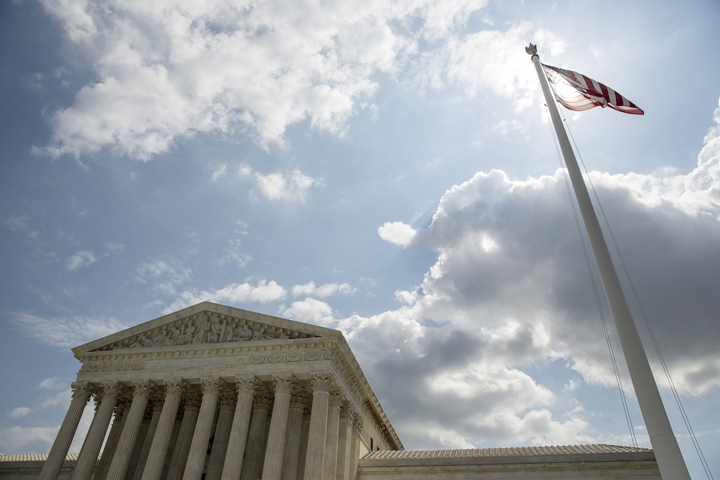
The U.S. flag flies in front of the Supreme Court in Washington in this file photo from May 18, 2015. (CNS/Joshua Roberts, Reuters)
Florida may be in legal chaos now after a U.S. Supreme Court found the state's death penalty process unconstitutional, but for the grassroots coalition working to end executions there, the path is clear: when more Floridians know more about the state's death penalty practice, the tide will turn in favor of abolition.
On Jan. 12, the court nullified Florida's death sentencing system in which a jury gives their majority vote recommendation of life or death to the judge, who then independently weighs aggravating and mitigating factors before determining the sentence.
"The Sixth Amendment requires a jury, not a judge, to find each fact necessary to impose a sentence of death," Supreme Court Justice Sonia Sotomayor wrote for the 8-1 majority in the Hurst vs. Florida decision. "A jury's mere recommendation is not enough."
Jurists, state officials, and legislators in Florida are scrambling to figure out how the ruling will affect current death warrants, upcoming trials, and past sentences.
Florida's death penalty record is among the worst: it has the second largest death row population (400), more exonerations than any other state (26), and the second highest number of death sentences in 2015 (9). The current governor, Rick Scott, has ordered and overseen more executions (23) than any Florida governor since the practice came back in 1977.
"I was not surprised by the ruling," said Mark Elliott, executive director of Floridians for Alternative to the Death Penalty (FADP), a coalition founded in 1999 which advocates an end to Florida's death penalty. "It has been apparent for some time that Florida is an outlier with a death sentencing scheme outside the constitution. This is forcing a much needed review of our sentencing practice."
Delaware and Alabama are the only other states where a judge can override a jury's sentencing recommendation in a capital case.
"With the state legal departments in such chaos right now, it's obvious there needs to be a pause in executions and death sentences until this is worked out," Elliott continued. "It would be unconscionable to go forward with executions when the very sentencing law is found to be unconstitutional."
Last year, Florida executed two people, and one already this year. Two more executions are planned for February and March.
2015 was an important year for the FADP coalition. Coalition members teamed up for an unprecedented statewide tour, engaging in over 60 private meetings and speaking events, with civic and church groups, to raise awareness about the death penalty's toll.
"Things are coming together now in a way that never happened in Florida previously," said Elliott of the coalition's efforts. FADP memberships includes organizations ranging from Catholic groups like Florida Conference of Catholic Bishops, Pax Christi and the Community of Sant'Egidio, to other Christian and non-Christian faith groups and secular organizations like the ACLU and Amnesty International. Individual legal and medical professionals, criminologists, ex-death row inmates, and victims' family members, are also members, along with local abolition groups in Tallahassee and Gainesville.
"The key to our coalition is focusing on only what we have in common -- a desire to see the end of the death penalty in our state," said Sheila Hopkins, FADP's board chair and president of the National Council of Catholic Women. Hopkins previously worked 12 years on the issue for the Florida Conference of Catholic Bishops.
Broad-based grassroots coalitions like FADP have been crucial factors in several successful anti-death penalty campaigns in other states in recent years. The Florida coalition plans to intensively increase outreach this year, Elliott said, including hiring a full-time organizer.
Catholic groups have had a huge role in moving things forward in Florida, Elliott said. "The church does not just talk the talk, they walk the walk."
Among other efforts against the death penalty, Florida's eight Catholic bishops have pushed for a change to Florida's capital sentencing scheme for years, "to at least minimize the evil" said Ingrid Delgado, associate for Social Concerns for the Florida Conference of Bishops, based in Tallahassee. In a Jan. 12 press release, the bishops urged Florida legislators again to "pass legislation which requires juries, as a collective body and conscience of the community, to be unanimous in the finding of aggravating circumstances and in recommending death over life imprisonment."
Each time an execution date nears in Florida, the bishops urge the governor for a stay and for a commutation of the sentence of that person and all other death row inmates to life in prison, Delgado said. An action network, coordinated by the conference, urges citizens contact the governor. Catholic prayer vigils are held in over 20 locations throughout the state.
"When citizens learn more about the death penalty they become more uncomfortable with it," Delgado said. "In my role, I have the opportunity to dispel a lot of myths, even in Catholic circles. People are surprised when they learn life in prison is less expensive and that the death penalty has no deterrent effect, for example."
Hopkins said the FADP coalition members take great inspiration from the 11 states which have either abolished the death penalty or established moratoriums in the last eight years.
"We have hope, but it's going to take time," said Hopkins. "We are really picking up steam now."
[Dani Clark is a writer and editor at an international development organization in Washington, D.C., and a member of the Community of Sant'Egidio.]



